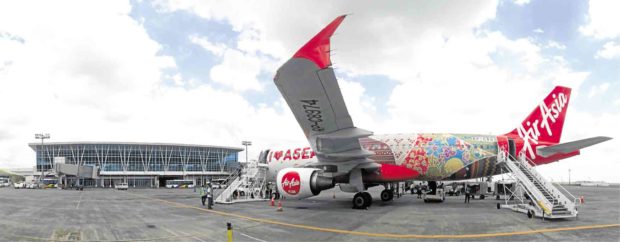
CALM BEFORE STORM Clark International Airport is bracing for a workers’ strike following a stalemate in talks between the Clark International Airport Corp. and workers. —TONETTE OREJAS
CLARK FREEPORT — The employees’ union of Clark International Airport is set to file its strike vote result on Monday and freeze work there within seven days.
The state-owned Clark International Airport Corp. (Ciac) showed “no serious interest in settling the labor dispute” during negotiations held on Jan. 15.
The negotiations took place after the Samahan ng mga Manggagawa sa Diosdado Macapagal International Airport (SMD) conducted a Jan. 8 strike referendum, a union statement said.
At least 158 union members voted to go on strike, while 13 voted “no” and three other members abstained.
Dennis Lumanlan, union president, said the referendum results would be filed in the National Conciliation and Mediation Board regional office.
Union demands
By law, the strike may be staged within seven days after the union notifies the government labor office about its decision.
Following the privatization of the airport’s operations and management, SMD demanded wage increases, allowances and other benefits that were prescribed by their 2011-2018 collective bargaining agreement (CBA).
The union also demanded the nullification of waivers of employees, which allowed Ciac to deduct health and hospitalization benefits from their retirement packages and separation pay.
The union also sought the automatic absorption of regular employees by North Luzon Airport Consortium (NLAC), which won the bid to operate and maintain the airport and the automatic recognition of their labor union by NLAC.
SMD wanted the issues resolved before NLAC took over.
Meager offer
“Ciac only offered a meager and unacceptable involuntary separation package and nothing [about] other demands,” SMD said.
Jaime Melo, Ciac president, said the airport firm “offered the most we could — legally.”
The company pitched a severance pay amount that would be 1.5 times more than workers’ monthly salaries, which President Duterte has yet to approve.
Melo said the Ciac proposal was “very close to their (union’s) original CBA demand.”
“Now they want 2.5 times more,” Melo added.
Most benefits, he said, were disallowed by the Commission on Audit and the Governance Commission for government-owned and -controlled corporations (GOCCs).
Some of these benefits were CARE (crisis amelioration and resource enhancement), emergency, cost of living allowance, rice and hazard pay.
Duterte EO
Executive Order No. 36 stipulated that CBA benefits shall not be suspended in GOCCs like Ciac where the Salary Standardization Law (SSL) is not applied, the union argued.
SMD claimed that Ciac circumvented EO 36 by opting for a modified salary standardization scheme “without the [union’s] approval.”
Melo, however, said “no objections were recorded” about the modified SSL. The SSL, he said, “enabled more than 70 percent of employees to have a substantial wage increase.” —Tonette Orejas

